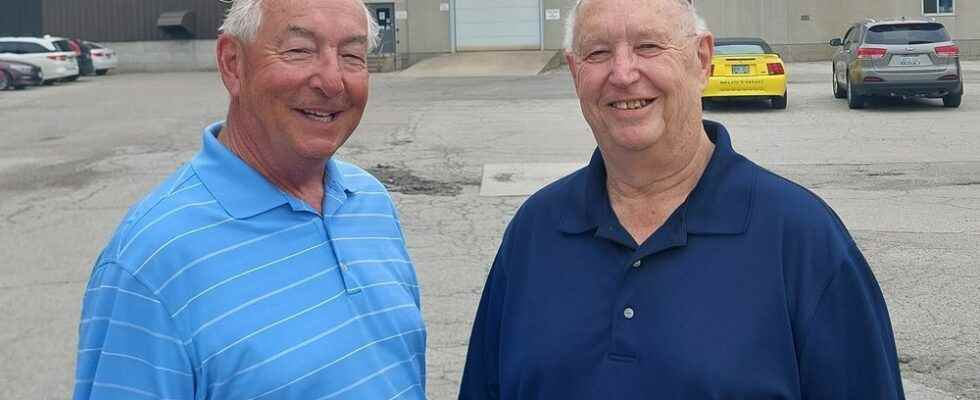
DRESDEN – Numerous Dresden-area residents and farmers have enjoyed a good living – and for many a good retirement – thanks to the presence of a tomato processing facility here.
Food processing giant Conagra Brands Inc. hosted a party Sunday to celebrate the 75th anniversary of the tomato processing facility, which opened on Wellington Street in Dresden in 1947.
“It’s such a special thing the Dresden community has here with this facility, the history, the employees and just their passion,” said plant manager Simon Hogervorst.
He noted generations of families have worked at the plant along with generations of farm families that have grown the tomatoes that are processed there.
“It’s so special how the facility is so integrated into the community, the families and the surrounding area,” Hogervorst said.
Today the approximately 200 Conagra plant employees and another approximately 200 seasonal workers during the fresh pack season, work to process seven million cans annually.
Former plant manager Dave Hoyles, who started at the plant in 1980 as a first-line supervisor, said, “I think automation and innovation are the two biggest things I’ve seen change.
“When I first came here, everything was basically done by hand,” he added. “It was hand-peeled, hand-cored.”
Having worked his way up to be plant manager by 1987, Hoyles said it is the people that made the job so enjoyable.
“Quite literally, I would spend 80 per cent of my day out on the floor, walking around talking to people, finding out what was good, what was bad – trying to accentuate the good and eliminate the bad,” he said.
Hoyles served as plant manager until 2005, before moving to a position in Toronto with the company, than later retiring in 2012, after 32 years.
The presence of a tomato processing facility in Dresden goes back to 1903 when Canadian Canners opened for business.
Long-time Dresden municipal politician Joe Faas, who worked at the plant for a season more than 50 years ago, said, “In my opinion, the town of Dresden would be a whole lot different than it is today, if we didn’t have the canners.”
He remembers when the plant did spinach, asparagus, beets and potatoes as well as tomatoes, adding the facility has provided good jobs and also benefitted the local farming community.
Faas said many employees were able to “come out of school, stayed here and made a career here.”
He said guys like Hoyles and Donny Roberts went up the ladder to become plant manager.
Infrastructure, such as a sewage treatment plant and a water supply from Lake Erie may not have been in Dresden today without this plant, Faas said.
“It’s a great testament to what an industry can do for a community.”
Bob Vandeweghe is one of the employees who moved up the ladder and made a career at the plant.
He started working March 24, 1962 on asparagus farms driving tractor.
“In 1966, I transferred into the factory and I began as a supervisor in 1981,” Vandeweghe said, adding he retired Dec. 31, 2004 after 42 years.
“It was great working, we had a lot of different owners, we had a lot of different names, and they were all good,” he said.
When he first started in the plant, Vandeweghe said, “It was not uncommon to work a 12-hour shift.
“In those days, you did a lot of manual work, but as time when on technology took over,” he added.
Hoyles also got to know the local growers who supplied the tomatoes for processing; adding he also knows their fathers and some of their grandfathers.
Hoyles said negotiating contracts and terms could be confrontational at times, but once an agreement is reached “you shake hands and we get along famously.”
Brothers Sam and John Janovicek followed in their father Paul’s footsteps to be grow tomatoes for the plant.
Sam Janovicek said his father used to grown for Libbey’s, but noted a field man came by the farm one day and said, “’Paul, you should grow for the canners,’ and he decided to do that.”
He’s seen a lot of changes over the year in the tomato industry, noting: “The tomatoes used to be picked and put in baskets and now it’s bulk and we use harvesters, we don’t have to depend on help too much.”
John Janovicek said the brothers have been involved in growing tomatoes for the plant pretty much all of their lives.
“We were out in the tomato field when mother was picking,” he said.
When asked what the plant has meant to the family, John Janovicek said, “It’s paid a lot of bills, it’s been good to us.”
